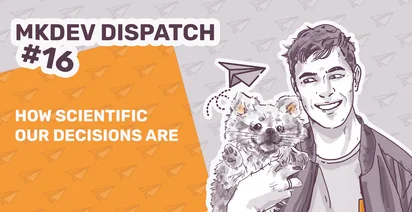How Scientific Our Decisions Are | ✉️ #16

Hey! 👋
When it comes to the progress in our field, I tend to be an optimist. I think we moved forward quite a bit, and I think we generally keep improving and move forward. On the other side, when you actually try to distill which new truths we discovered, it appears to be an impossible task. And it reminds me how far away what we do is from science. Usually, in science, new explanations make previous ones either obsolete, or reduce them to useful mental models, that do not actually properly explain how the world works.
As one example, humanity believed that the sun revolves around the Earth. But then, we got a good explanation of why it’s not the case. The old explanation was good, till it wasn’t. A new, better one replaced the old one.
Another example, Euclidean geometry. For centuries, it was hard to argue that the sum of angles of a triangle is 180 degrees. What we’ve learned is that in an outer space it’s not the case. It had big practical implications: without accounting for the relativistic effects, the GPS would accumulate significant errors in position calculations, rendering it much less useful for practical applications.
On the other side, the theory of relativity is not that useful to our day-to-day lives. Here, far away from the outer space, things behave according to Newtonian physics and Euclidean geometry still applies. Some explanations are totally valid in one context and become mostly useless in another.
In IT field, we tend to believe that almost every single explanation of the past and the present is valid, as long as it operates within the right context. We rarely collectively decide, that one way of doing things is not valid anymore, period. Instead, frustratingly often we have to say “it depends”. And more often than not, it depends on things like budget, marketing, personal preferences, ego, politics.
I can’t imagine things working out in the same way in the scientific field. The Earth won’t become flat, and the sun won’t start revolving around our planet only because someone doesn’t like that idea, or because there is no budget, or because a friend of the boss recommended sticking to that view of the universe.
Thus, we should not take ourselves too seriously. In most cases, there is no the way of doing things, but there are many ways to do everything, and the reason we choose one or the other is not entirely scientific. Each of us can independently decide what is important and what is not. And in which case there is the way of doing something? Well, it depends.
What We've Shared
Talk to GPT! We want to present you a tool that is going to make your chat GPT talk, and even hear you.
Is AWS AppRunner the worst way to run containers? AWS AppRunner is one of the latest additions to a billion ways to run containers on AWS. Is it any good? Let's find out!
Terraform: Migrating Components Between State Files. Since terraform state mv has been deprecated there is only one way to migrate objects from one state file to another and today we will learn how.
'DevOps Accents', episode 8: In this episode of DevOps Accents, Leo and Pablo miss their friend Kirill and talk about the rapid growth of AI technology we found ourselves in.
What We've Discovered
Data on EKS: Data on EKS (DoEKS) provides best practices, examples, and architectures aimed at making it easier to build, deploy, and scale data-intensive workloads on EKS. Should be a great way to quickly setup Kubeflow or Airflow on top of EKS, in a proper way.
Kubernetes 1.27 New Features: sysdig did another round up of new features and biggest changes, now for Kubernetes 1.27!
Building GitHub with Ruby on Rails: GitHub remains one of my favorite examples of large scale production usage of Ruby on Rails. Love to see them sticking to the best framework out there.
Cut AWS WAF Costs with Shield Advanced: A neat trick on how to cap the cost of AWS WAF by using Shield Advanced.
Implement Resource Counters with Amazon DynamoDB: An in-depth walktrough of 7 ways to implement counters in DDB. Sadly, option #8 is missing: using SQL database.
A random reminder
This July you can meet us in Munich at Kubernetes Community Days!
The 17th mkdev dispatch will arrive on Friday, April 28th. See you next time!
